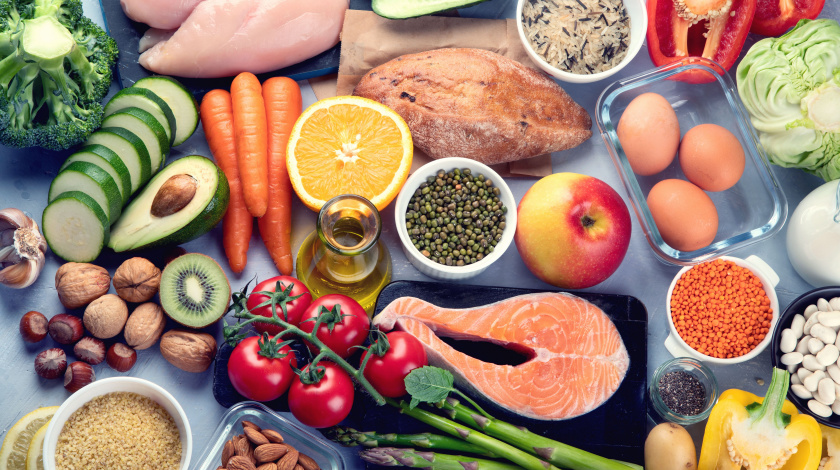A glucometer and tailored diet not only allow people with diabetes to manage their blood sugar level efficiently and consistently but also improve the overall health quotient. It is now an open secret that foods such as white bread, potatoes, raw sugar, soft drinks, and cookies are high in glycemic index. These edible substances are quickly processed by our stomach, resulting in an instant spike in blood sugar levels. On the other hand, oats and unprocessed wheat are low in GI and high in nutrients, making them an excellent option for people with diabetes.

Importance of Nutrients –
Low GI foods not only provide essential vitamins, but highly balanced nutrients reduce the risk of blood sugar spikes. For example, a meal containing good fibres, healthy fats, and balanced protein usually takes a long time to digest. The resultant sugar generated for energy needs is also released slowly into the bloodstream, thereby preventing a sudden rise in glucose levels.
Introduction to Glucometers and Blood Sugar Monitoring
A glucometer is your frontline tool for managing diabetes, especially the type-2 variant. This portable instrument is like a ready reckoner, providing several data pointers that affect blood glucose levels. However, along with this device, you will also need test strips, lancets, a record book, or an app that monitors and saves the results in digital format.
You must check your blood sugar levels before every meal and repeat the same steps two hours later. By adopting this strategy, you will know which foods are responsible for the increase in your sugar levels, allowing you to achieve your diabetes goals over a predetermined timeline. You also need to understand that apart from nutrition, stress and lifestyle also play an important role in diabetes, and therefore, while noting down the readings or saving them digitally, make sure you append/annotate/mention these events as well. For all you know, it is not food but external factors which are causing unusual rise in sugar levels. An advanced glucometer machine can make a big difference in such a scenario.
Understanding Blood Sugar Levels
Type 2 is one of the most common types of diabetes across the globe. Unlike gestational diabetes, which is temporary in nature or type-1, which is caused by an autoimmune reaction and generally appears at a young age, type-2 diabetes is the result of unhealthy lifestyle, stress, and vices such as smoking and alcohol consumption. Interpreting glucometer readings (blood sugar levels) is relatively easy.
- Fasting or empty stomach reading should be less than 100 mg/dL
- Post-meal or after eating, the reading should be less than 140 mg/dL.
Note – Post-meal blood sugar level is checked two hours after eating. This ensures that the food has been completely digested/undergone metabolism in its entirety.
People with type-1 diabetes typically check their readings multiple times a day because their blood sugar levels tend to fluctuate. Some even use CGM or continuous glucose monitoring systems for this task.
Factors Affecting Blood Sugar
Blood sugar levels in humans can be easily affected by a number of factors. For example, a carbohydrate-rich meal, consumption of sugar-based products, and a passive lifestyle can instantly result in a glucose spike. However, other factors can affect glucose levels, which include –
- The body is unable to produce sufficient insulin.
- Medications for other chronic illnesses can also result in a spike.
- Incorrect use of diabetes medicines or inaccurate interpretation of glucometer reading.
Carbohydrates and Blood Sugar
The connection between carbohydrates and blood sugar is relatively straightforward. The human body typically breaks down the carbohydrates in food/meals and converts them into sugar. This is passed into the bloodstream, which results in an increase in sugar levels. A hormone produced by the pancreas, called insulin, transports/signals the cells to absorb this sugar. While the body immediately uses up some of this generated glucose for its energy needs, some is stored for later use. What keeps this cycle of sugar production and consumption in top form is insulin. Insufficient production of this hormone or if the body is unable to use it efficiently (insulin resistance) can result in type-2 diabetes. Only the best glucometer can help accurately monitor this serious medical condition.
Proteins and Blood Sugar
Protein in general and dietary protein in particular does not increase blood sugar levels. Therefore, adding this to your daily diet/meal is highly recommended. Even so, these studies are still in their preliminary stages, and more tests need to be initiated to confirm this hypothesis. Regular consumption of protein may appear counterproductive because protein is broken down into amino acid, which is further converted into sugar through the gluconeogenesis process. However, in spite of the production of glucose from non-carbohydrates (proteins), the blood sugar levels are not impacted greatly.
Impact of Fibre and Whole Grains
Fibre is difficult to break down quickly, which in turn slows down the absorption process. This translates into the delayed formation of carbohydrates and, subsequently, sugar. It is this gradual, sluggish metabolic activity which prevents a spike in glucose levels. On the other hand, whole grains contain fibre, nutrients, and phytochemicals. These compounds help improve insulin sensitivity, which in turn prevents blood sugar spikes. Foods such as avocado, kiwi, and blueberries, and grains such as bran and nuts are great sources of fibre and nutrients.
Read More: The Role of Diet in Reversing Diabetes: Exploring Different Approaches
Conclusion –
Nutritional diet plays an important role in managing diabetes. However, without a glucometer machine, it may prove to be a futile effort because a part of diabetes management also includes monitoring blood sugar levels regularly. This simply means identifying foods that cause glucose spikes in spite of a nutrient-rich diet plan. Checking the blood sugar levels regularly, typically before and after meals, is important to achieve your targeted goals. Based on these readings, you can customize your diet or enrol in a comprehensive diabetes care program. BeatO, one of the leading start-ups in this domain, offers state-of-the-art devices, test strips, medicines & readings, which can be stored digitally and shareable too.
Disclaimer:The content of this article is compiled information from generic and public sources. It is in no way a substitute, suggestion, or advice for a qualified medical opinion. Always consult a specialist or your own doctor for more information. BeatoApp does not claim responsibility for this information .
Dr. Navneet Agarwal is an established and highly skilled Diabetology with over 25 years of experience in Diabetology & Obesity. He is well-regarded for his quality and patient-centered diabetes care. Also, keep track of your blood sugar levels with a Doctors’ approved smart glucometer and elevate your healthcare routine.




